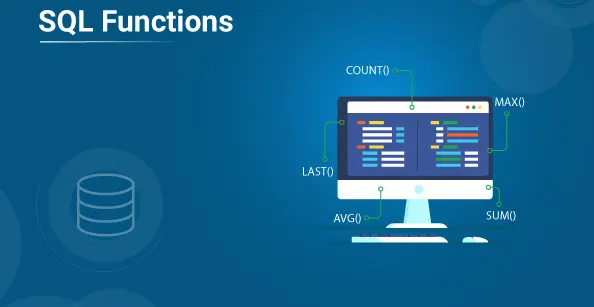
Structured Query Language (SQL) stands as a domain-specific language designed exclusively for the management of relational databases. Renowned for its exceptional capacity to manipulate and retrieve data, SQL relies on a potent combination of functions and expressions. Serving as the backbone of data management, SQL provides a versatile and indispensable tool for interacting with databases. Its functionality extends to efficiently storing, retrieving, and modifying data, making it pivotal for tasks in business intelligence and software development.
The power of SQL empowers businesses and professionals alike, facilitating the extraction of valuable insights embedded within data. This capability, in turn, propels informed decision-making and fosters innovation across a spectrum of industries. As the digital landscape continues to evolve, SQL remains a fundamental skill, playing a crucial role in shaping the landscape of data-driven processes and applications.
SQL functions, essential in database management, are predefined procedures designed to yield a single value. Operating on input data, these functions generate results crucial for data analysis and manipulation. Categorized into distinct groups, including mathematical, string, and aggregate functions, they efficiently handle various data operations. SQL functions are integral to extracting meaningful insights from databases, streamlining queries, and enhancing the overall efficiency of data retrieval and analysis processes.
Scalar Functions: Return a single value, based on single or multiple inputs.
Examples:
UPPER (): Converts a string to upper.
LENGTH (): Returns the number of characters in a string.
Aggregate Functions: Operate on a set of values, typically across rows, and return a single aggregated value.
Examples:
SUM (): Adds up values in a numeric column.
AVG (): Calculates the average of values in a numeric column.
SQL functions with categories like scalar and aggregate functions, are used for converting strings into upper format and calculations through Upper(), Length(), Sum(), and Avg() functions.
An expression is a combination of one or more values, operators, and SQL functions that evaluate a value. These expressions can be used in various parts of SQL statements, like the SELECT, WHERE, and HAVING clauses.
Example:
SQL Expressions is a combination of one or more values, operators, and SQL functions that evaluate a value…
There are many types of Common SQL Functions, some of them are:
String Functions: Manipulate or return information about text.
Examples:
LOWER (): Converts a string to lowercase.
CONCAT (): Joins two or more strings together.
Date and Time Functions: Deal with the date and time values.
Examples:
CURRENT_TIMESTAMP: Return the current date and time.
DATE_ADD (): Adds a specified time interval to a date.
Mathematical Functions: Perform calculations on data.
Examples:
ROUND (): Rounds a number to a specified decimal or precision.
ABS (): Returns the absolute value of a number.
Conversion Functions: Convert data from one type to another.
Examples:
CAST (): Converts one data type to another.
CONVERT (): Another way to convert types, often specific to Microsoft SQL Server.
Conditional Expressions: Conditional expressions in SQL allow for decision-making based on specified conditions.
CASE WHEN: Performs conditional logic in queries.
Output:
In conclusion, Common SQL functions with categories like string and date-time functions, and mathematical functions are used for converting strings and calculations.
You can combine multiple functions and operators to create more complex expressions.
Example:
In conclusion, you can combine multiple functions and operators to create more complex expressions.
SQL functions and expressions play a pivotal role in database management, offering essential tools for data manipulation and analysis. These functions, ranging from mathematical and string operations to aggregate functions, empower users to retrieve, transform, and derive valuable insights from their data. By incorporating SQL functions, developers and analysts can streamline complex queries, enhance data accuracy, and optimize performance. Expressions, on the other hand, provide a means to create dynamic calculations and conditions within queries, adding a layer of flexibility to data retrieval and presentation.
The significance of SQL functions and expressions lies in their ability to facilitate efficient and precise data operations, supporting informed decision-making in various industries. Mastery of these features not only improves data processing efficiency but also contributes to the overall effectiveness of database-driven applications, ultimately shaping the success of businesses in the data-driven era.
1. Data Manipulation:
SQL functions facilitate efficient data manipulation by providing pre-defined procedures for mathematical, string, and aggregate operations.
They streamline queries, ensuring accurate and optimized retrieval, transformation, and analysis of data.
2. Dynamic Calculations:
Expressions in SQL enable dynamic calculations within queries, enhancing flexibility in data retrieval and presentation.
This feature empowers developers to create complex conditions and calculations, contributing to more adaptable and insightful database operations.
In conclusion, the importance of SQL functions and expressions is for their role in ensuring data accuracy and enabling dynamic calculations.
SQL functions and expressions empower you to perform sophisticated data manipulations within the database itself, minimizing reliance on post-processing in application code. Mastery of these features enhances your ability to optimize data retrieval and analysis, streamlining database operations for increased efficiency. By honing your skills in crafting SQL queries, you can unlock the full potential of these tools, enabling precise control over mathematical, string, date, and aggregate operations. This proficiency not only contributes to more efficient data management but also fosters a deeper understanding of your database structure. Through consistent practice and exploration, you can elevate your SQL proficiency, ensuring you can tackle diverse data challenges with confidence and precision, ultimately contributing to more robust and effective data-driven decision-making processes.